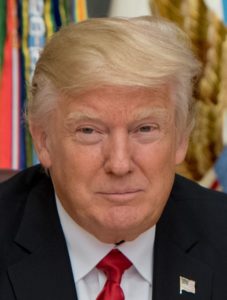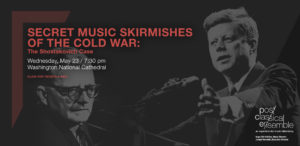The Age of Trump has rapidly changed the American cultural landscape in many ways.
In the silo of classical music, there is suddenly a felt need to ask: What’s it for? Why are we doing this?
How can the arts affect social or political change?
How can concerts help us understand who we are as a nation? What we’ve been or want to become?
These questions are newer than they should be. So long as orchestras cling to traditional templates – the generic mixture of concerto and symphony; the mandatory soloist ; the deferent audience – they will rarely be satisfyingly addressed.
Because we program thematically and across the disciplines; because we regularly interface with schools, universities, and museums; because we invariably invite our audience to speak, PostClassical Ensemble has been tackling such questions for some time. And now that we’re Ensemble-in-Residence at the Washington National Cathedral, this exercise will become more concentrated and (we hope) more impactful.
Our new season, for instance, closes with “Secret Music Skirmishes of the Cold War: The Shostakovich Case.” We’ll take a close look at the CIA’s Congress for Cultural Freedom, and how it waged war with Soviet propagandists to capture the hearts and minds of intellectuals on the left in Europe and Latin America. The participants will include Nicholas Dujmovic, former Staff Historian of the CIA, and an actor impersonating President John F. Kennedy. Kennedy’s claim that the arts can only flourish in “free societies” will be juxtaposed with the evidence of piano works composed by Dmitri Shostakovich as performed by a formidable American pianist. We’ll also invite our audience to read a couple of pertinent books: Frances Stonor Saunders’ The Cultural Cold War: The CIA and the World of Arts and Letters and Marina Frolova-Walker’s new and revelatory Stalin’s Music Prize. That’s May 23 at the Cathedral.
Our annual PCE “immersion experience” is “The Russian Experiment” — a look at experimental Soviet culture before Stalin. The pertinent events include Vladimir Feltsman performing Mosolov, Roslavets, and Protopopov (whose visionary Piano Sonata No. 2 from 1924 is a major find); and the 1929 classic silent film The New Babylon with Shostakovich’s symphonic score performed live. We’ll want to inquire what this idealistic adventure in political music and cinema amounted to, and why Stalin put an end to it.
Our ongoing “American Roots” initiative explores little-known chapters in the history of African-American music (without which there would be no American music). This season, we focus on Harry Burleigh, who turned spirituals into art songs, and the once famous black British composer Samuel Coleridge-Taylor, whose historic visits to the US (facilitated by Burleigh) immersed him in plantation song and its potential for the concert hall. A major theme of these events will be the subsequent bifurcation of American music into classical and popular – white vs. black. How did that happen? What did it cost us?
I append an overview of our 2017-2018 season. For more detail, click here.
Oct. 19 – “The Russian Experiment” with Vladimir Feltsman
Dec. 7 – “Music in Wartime: A Pearl Harbor Day Commemoration”
Feb. 28 – “Deep River: The Art of the Spiritual”
March 30-31 – “The New Babylon” – The Soviet silent film classic with Shostakovich’s score performed live
April 21 – “The Star of Ethiopia”: Samuel Coleridge-Taylor’s Historic Visits to DC (1904-1910)
May 28 – “Secret Musical Skirmishes of the Cold War: The Shostakovich Case”



The McCarthy piece and this Cold War examination is fascinating.
The “Cultural Cold Wars ” is a bombshell of a book
Congratulations Joe on these Fantastic ideas !
Stoner’s book is not the one I would recommend on the subject. A more comprehensive and balanced treatment is Hugh Wilford’s The Mighty Wurlitzer: How CIA Played America (2009). Dr. Michael Warner, a respected former CIA historian, reviewed it here: https://www.cia.gov/library/center-for-the-study-of-intelligence/csi-publications/csi-studies/studies/vol52no2/pdf/U-%20Studies%2052-2%20-Jun08-MightyWurlitzer-Web.pdf
Sorry–I meant Saunders’ book is not the one I would recommend.